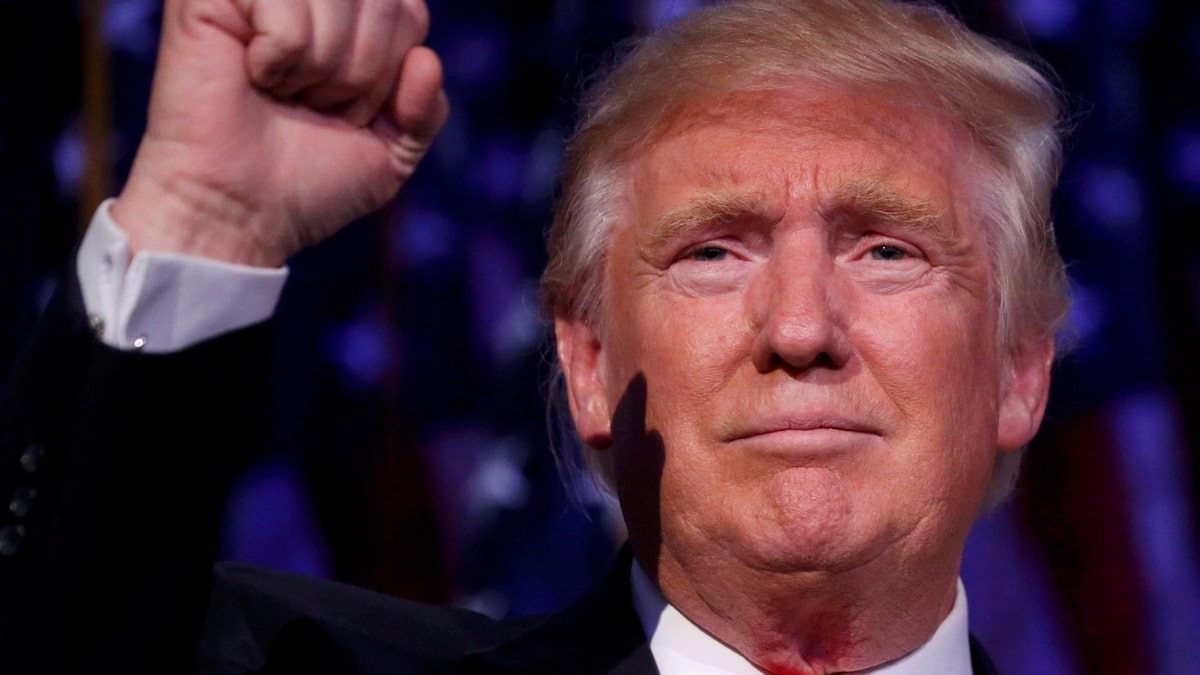
U.S. President-elect Donald Trump speaks at his election night rally in Manhattan, New York, U.S., Nov. 9, 2016. (REUTERS/Carlo Allegri)
Well, it’s finally over, and yet it’s only just beginning. In one of the unexpected upsets in modern history, Donald Trump is going to be the next president of the United States. In some ways, this result is the fulfillment of the political discontent that first began to manifest itself as the Tea Party in 2008, a desire for something more than business as usual. But as we enter 2017, it’s clear that we are more divided than ever, with no clear path forward getting to more prosperity and freedom for all Americans.
People are protesting in the streets, they’re setting things on fire, the #NotMyPresident hashtag is trending on Twitter. This is not what a healthy democracy looks like.
I’m not suggesting that those who fear Trump just suck it up and embrace him, but the violence doesn't help your cause.
It's important to understand that Trump is a symptom -- not of a country that is inherently racist, sexist, or bigoted, as some have claimed -- but of a political system that just doesn’t work in a world where everyone is freer to think outside the establishment's box.
One good thing we can take away from this cycle is the indisputable realization that our political system is badly behind the curve of technology driven disintermediation. What is it that alcoholics are told? The first step to recovery is admitting you have a problem.
Democratic voters who preferred Bernie Sanders to Hillary Clinton were denied a voice by rigid party control and superdelegates. They feel disenfranchised, like their vote doesn’t matter, so much so that I’m willing to bet a fair number of them ended up supporting Trump over Hillary. Trump voters were tired of nominating the same recycled Republicans who talk a good game, but ultimately fall down when it matters (see Bob Dole, John McCain, and Mitt Romney). Both parties failed the people who have supported them through the years.
Enter Donald Trump.
But the problem is a deeper one than the way the parties are run. It’s the fact that we’re stuck with just two parties in the first place. By all accounts, both Trump and Clinton were the least popular presidential nominees there have ever been. And yet many voters felt forced to vote for one of them. This lack of enthusiasm ultimately cost Clinton the election.
This is partially due to fear — fear that the candidate you despise might win if you don’t vote for the one you merely hate.How can we get better choices later if we are stuck not making a third choice now? We should consider looking at reforms like Rank Choice Voting, an alternative to the current “first past the post” voting system, that might enfranchise more, and better, alternative candidates.
Part of it is habit. It’s easy to pick a team, red or blue, and simply vote down the line every election. How can we make it easier for busy people to get better information? This barrier is a tougher one to overcome, and requires continuous educational efforts, particularly aimed toward young people.
But a major reason why we are repeatedly forced to choose between the lesser of two evils is that the system is designed in such a way as to make it almost impossible for anyone else to gain national recognition as a serious candidate.
The Commission on Presidential Debates, an organization run by professional Democrats and Republicans, studiously devises rules that keep third parties off the main stage. It’s a cartel. It’s also a frustrating Catch-22. People have to know who you are before you can get on the presidential stage and show them who you are.
People know they’re unhappy with the choices they’ve been given. But technology and easy access to new information means that we don’t have to do as we’re told anymore.
It’s Ok to color outside the lines. It’s better than OK, in fact. It’s downright American.
Things can change, but only if we demand that they do. It’s up to us to build something that empowers the people from the ground up.
Top down control is steadily being toppled in every aspect of our culture due to disruptive technology and the new ways young people consume information. One size fits all politics may be the last one to fall, but fall it will, and we’ll be better off for it.
I’ve always said that politics is a lagging indicator of culture. Upstream of politics, our culture is free to choose, iconoclastic and entrepreneurial.
I can’t wait for the day when our politics reflects the rest of our world.
